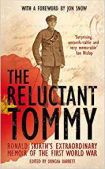The Reluctant Tommy: An Extraordinary Memoir of the First World War by Ronald Skirth and Duncan Barrett
| The Reluctant Tommy: An Extraordinary Memoir of the First World War by Ronald Skirth and Duncan Barrett | |
|
| |
| Category: Autobiography | |
| Reviewer: John Van der Kiste | |
| Summary: The memoirs of Ronald Skirth, a non-commissioned officer in the Royal Artillery during the First World War, whose experiences turned him into a lifelong pacifist | |
| Buy? Yes | Borrow? Yes |
| Pages: 324 | Date: April 2010 |
| Publisher: Macmillan | |
| ISBN: 978-0230746732 | |
|
| |
Ronald Skirth was one of many young Englishmen of nineteen caught up in the First World War. He joined the Royal Garrison Artillery in 1916, was promoted to Corporal, and sent to the western front. Like most of his contemporaries, when he went he was an unquestioning servant of King and country, fighting for what he believed was right. On the battlefields of Flanders, one day he came across the body of Hans, a German soldier the same age, if not younger. The dead man's hand was clutching a photograph of his girlfriend, who could almost have been the twin sister of Ella, Skirth's own sweetheart. Like two of his friends who had just been killed, Hans had died as a result of the stupidity of others.
As a result of this experience, more than any other, the Englishman swore he would never again knowingly take another human life, even in war – unless he had orders which he could find no way of evading. In the first week of 1918 he went into a church and made a solemn vow to that effect, in return for God's gift of life to him. It was a principle which had already got him into trouble with several of his superior officers, who angrily told him he was a coward and a 'conchie', a pejorative term for a conscientious objector.
He soon came to resent some of them, particularly a commander in his sector, for his blind pride and obstinacy, complete indifference to the plight of his men, and wrote that if he had possessed a suitable weapon he would gladly have used it on the man. For standing up to another commanding officer when he refused to take part in destroying a church, he was demoted in rank and relegated to the bottom of the leave rota. Towards the end of the conflict, he refused to accept a decoration for carrying out everyday duties on the grounds that he had done nothing to deserve it, and his beliefs would not allow him to be rewarded for helping to kill people. There are some tantalizing pictures of arrogance at the senior level. One episode in the battle of Asiago, in northern Italy, was apparently invented by one of his officers and the British commander in Italy, simply as a means towards their own self-glorification.
Fortunately he not only survived but, to use the old cliché, lived happily ever after. Throughout his time abroad, within the constraints of the official censor, he had regularly written to Ella in Sussex. Shortly after the armistice, he returned to England and they were reunited. They were married in 1924, and some four years later had a daughter, Jean. In 1971 he began to write his memoirs, not specifically for publication, but really to commit them to posterity for the benefit of his nearest and dearest. He died in 1977, and twenty-two years later Jean presented the majority of his work to the Imperial War Museum, while retaining the most personal sections. A Channel 4 documentary on conscientious objectors led to the archive, and resulted in the editing of the material by Duncan Barrett and the publication of this volume.
It is a moving story in which Skirth states unequivocally that he never renounced his pacifist beliefs or changed his mind about the futility of war. As a contribution to the ever-growing literature about 1914-18, it will prove invaluable. Twice in his lifetime, he says in his Postscript, Britain had declared war against Germany to protect a weaker ally, firstly Belgium, then Poland. British so-called assistance, he maintained, was useless. Both countries were overrun within days, and local wars grew into wider conflicts which resulted in an estimated twenty-eight and a half million deaths.
Even so, he was optimistic about the younger generation. The long-haired, strangely appareled youth he saw around him would make mistakes, like the rest of them, but would have learnt the lessons which would prevent them from repeating the colossal blunders of their predecessors who plunged their country into war because they hadn't the vision to do anything else. Barrett adds his own postscript to these words. As he sat writing the introduction to this book, the BBC news website carried a headline 'UK may have 40-year Afghan role'. What goes around comes around.
Our thanks to Macmillan for sending Bookbag a review copy.
If you enjoyed this, you might also find The Memorial to the Missing of the Somme by Gavin Stamp, another First World War title, of interest.
Please share on: ![]() Facebook,
Facebook, ![]() Twitter and
Twitter and
![]() Instagram
Instagram
![]() You can read more book reviews or buy The Reluctant Tommy: An Extraordinary Memoir of the First World War by Ronald Skirth and Duncan Barrett at Amazon.co.uk Amazon currently charges £2.99 for standard delivery for orders under £20, over which delivery is free.
You can read more book reviews or buy The Reluctant Tommy: An Extraordinary Memoir of the First World War by Ronald Skirth and Duncan Barrett at Amazon.co.uk Amazon currently charges £2.99 for standard delivery for orders under £20, over which delivery is free.
![]() You can read more book reviews or buy The Reluctant Tommy: An Extraordinary Memoir of the First World War by Ronald Skirth and Duncan Barrett at Amazon.com.
You can read more book reviews or buy The Reluctant Tommy: An Extraordinary Memoir of the First World War by Ronald Skirth and Duncan Barrett at Amazon.com.
Comments
Like to comment on this review?
Just send us an email and we'll put the best up on the site.


